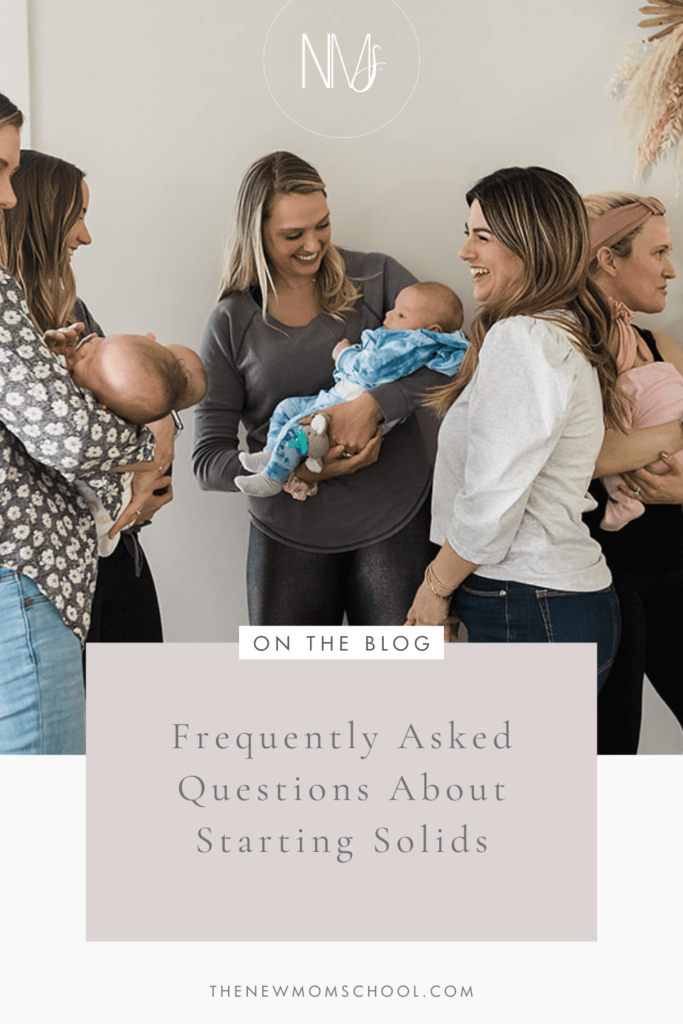When can my baby start solids?
I have found that this is a case-by-case answer. Some babies start eating solids at 4 months, while some wait until later. (The AAP (American Academy of Pediatrics) recommends breastfeeding as the sole source of nutrition for your baby for about 6 months.) As we all know, not all mothers can breastfeed and not all babies need to wait until 6 months to start solids. For instance, Pediatricians might recommend for babies with severe acid reflux to introduce rice cereal at 4 months to help settle the stomach and soothe the discomfort from the reflux. In general, if your baby is between 4 and 6 months and you’re noticing that your little one is waking up in the middle of the night more often than usual (probably because he’s hungry), or he starts opening his mouth when food comes his way, you are probably ready to enter the world of solids. Make sure that your baby is also able to sit unassisted and has good head control. The tongue-thrust reflex diminishes between 4 and 6 months, allowing the baby to swallow food as opposed to spitting it out.
Which foods should I first give my baby?
Most often, we see rice cereal being offered as baby’s first food but if you wait until your baby is 6 months or older to introduce solids, you can go right to veggies and fruits! Rice cereal was offered as a first food when the AAP advised babies to start solids at 4 months when their digestive tracts weren’t as developed. There is no need to start with rice cereal, In fact, rice cereal has no nutritional value (just like rice in our diets). It is just a very mild food that probably wouldn’t irritate your little one’s tummy. It could however, cause constipation which is heartbreaking to see your little one in so much discomfort! Introducing veggies and fruits as first foods are wonderful ways to go! If you are starting earlier than 6 months, a rice cereal or oatmeal might be a good option. I always recommend using an organic brand such as Earth’s Best. After cereal, many pediatricians will recommend starting vegetables before fruits, but there is no evidence that your baby will dislike vegetables if he starts eating fruits first. Meat comes closer to the one year mark.
How do I know if my baby is allergic to certain types of food?
You should give your baby one food at a time, and wait at least 3 days before you try another. That way, you can watch for any possible allergic reactions and determine each specific food is safe for his digestive system. Once you are in the clear for food allergies from each food, you can start combining foods with the ones you have already introduced!
How much food should I be giving my baby?
Recite this to yourself: “Solids before one are just for fun!” Solid foods before one year of age are meant to be complementary to breastmilk or formula. At each meal, you will want to ALWAYS feed baby breastmilk or formula first. Breastmilk and formula are baby’s main form of nutrition for the first year and solids are just a way for them to get used to new textures and flavors. You’ll always want to start solids at one meal in the morning so that baby has time throughout the day to digest the new food. Oftentimes after starting solids, you might notice your baby’s sleep regressing. This is often caused by a discomfort in the digestive system from the new foods. Try moving the foods to the morning and determining what the culprit is so you can be careful about not giving it later in the day until baby is older. Let your baby guide you on how much. Start with just a couple tablespoons per day and go from there.
What is Baby Led Weaning (BLW)?
Baby Led Weaning is a method of adding solids to your baby’s diet without pureeing and spoon-feeding traditional, mashed-up baby food. Baby led weaning allows babies to begin self-feeding from the very beginning of their solid food experience. Make sure any food you give is soft, easy to swallow, and cut into small pieces. Many moms like to start with small pieces of banana, crackers, or well-cooked and finely chopped chicken.
Should I make my own baby food?
If you’re up for it, absolutely! We offer a fun, interactive two-hour workshop which gives you all the information you need to get your baby started right with introducing solid food. You’ll also learn how to make your own baby food in a quick and easy way! We know making ALL of your baby’s food isn’t always feasible so I do advise that when you’re not able to make your own food, you purchase organic pre-made baby food.
Where can I find more information about solids?
My favorite website for obtaining information, recipes, calendars and ideas is www.wholesomebabyfood.com
Don’t forget to have fun and let your babies get messy! It only happens once in their lives!

